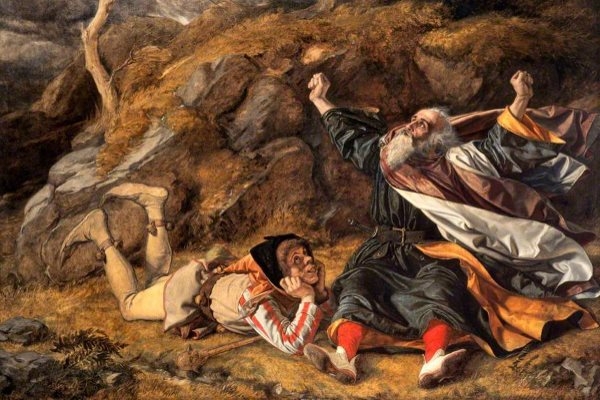By: Carol Tebbs, Rhonda Busby, Kathy Kipp
Sometimes it is easy to forget that the great books of literature are riddled with astrological references. Contrasting views about astrological fate are important in understanding the interactions of characters in Shakespeare’s play, King Lear. The older characters place great stock in the influence of the stars on human affairs, while the younger characters mock these superstitious beliefs. The viewpoints in the play mirror the attitudes and arguments about astrology that were taking place in the 1600’s. This article was written by Carol Tebbs (Kepler faculty), Rhonda Busby (graduate), Kathy Kipp (when she was a senior)
Early in the play, King Lear attributes all human existence to the influence of the stars (Act 1, Scene 1, Lines 109 – 112). Later in Scene 2, lines 103 – 137, Gloucester blames the recent eclipses for human difficulties, such as discord, mutinies, treason, and natural bonds dissolving. After he leaves, his son Edmund bemoans the superstition that blames all disasters and human misdoings on the stars, rather than man taking responsibility for them himself. Yet when Edgar enters and Edmund goes on about how their father blames these problems on the stars, Edgar asks him how long he has been a believer in astrology. Because Edmund knows Gloucester has these beliefs, he later tells him that Edgar mumbled wicked charms against him, conjuring the moon (Act 2, Scene 1, Lines 37 – 39). Another one of the younger characters, Kent, mockingly praises the great aspect in his chart that made him such a great man during an argument with Cornwall (Act 2, Scene 2, Lines 106 – 109).
In Act 1, Scene 2, the controversy between Gloucester and Edmund continues, with Gloucester espousing the “old” judicial view of astrology:
These late eclipses in the sun and moon portend no good to us. Though the wisdom of nature can reason it thus and thus, yet nature finds itself scourged by the sequent effects. Love cools, friendship falls off, brothers divide. In cities, mutinies; in countries, discord; in palaces, treason; and the bond cracked ‘twixt son and father. This villain of mine comes under the prediction, there’s son against father; the King falls from bias of nature, there’s father against child. We have seen the best of our time. Machinations, hollowness, treachery, and all ruinous disorders follow us disquietly to our graves. Find out this villain, Edmund, it shall lose thee nothing; do it carefully. And the noble and true-hearted Kent banished; his offence, honesty. “Tis strange.
Gloucester’s comments in lines 107-115 foreshadow the coming events that are “portended” by the sun and moon’s eclipses. Gloucester believes in the portents of the sky/astrology while Edmund does not believe that the stars have any influence over the lives of humans as seen in his response:
This is the excellent foppery of the world, that when we are sick in fortune, often the surfeits of our own behaviour, we make guilty of our disasters the sun, the moon and stars; as if we were villains on necessity; fools by heavenly compulsion; knaves, thieves, and treachers by spherical predominance; drunkards, liars, and adulterers by an enforced obedience of planetary influence; and all that we are evil in, by a divine thrusting on. An admirable evasion of whoremaster man, to lay his goatish disposition on the charge of a star. My father compounded with my mother under the Dragon’s Tail, and my nativity was under Ursa Major, so that it follows I am rough and lecherous. Fut! I should have been that I am, had the maidenliest star in the firmament twinkled on my bastardizing.
Ironically, as Edmund mocks predictive astrology, he characterizes himself as the villain that he indeed proves himself to be later in the play. Edmund states his “nativity was under Ursa Major, so that it follows that I am rough and lecherous.” (I, 2,134-5). Ptolemy assigned the fixed stars of Ursa Major like the disposition of Mars and Venus with Mars predominant.[1] Here “rough” seems to correlate with Mars and “lecherous” with Venus. Mars is known as malicious and evil. Ptolemy’s Tetrabiblos also saw the time of conception for a nativity as important as the time of birth.[2] By stating, “my father compounded with my mother under the Dragon’s Tail” he implies he was blighted by evil astrological influence. Edmund’s clear and concise attack on judicial astrology had great ethical and religious support in his time. Man was to discipline his will and fear God, most attacks coming from the church. Belief in an astrology that affected man’s will implied a limitation upon God’s supremacy. Robert Gray, clergyman, in An Alarum to England (1609) wrote at the time:
The stars do sometimes foreshow such things as happen, but they are not the enforcing causes of such things as happen. Most impious and blasphemous it is, to ascribe these things to the influence and operation of the stars: for it is to rob God of his honor, to derogate from his power, to overthrow his providence, and to tie God to secondary and subordinate causes, and in respect of ourselves, it extinguisheth the fear of God in us, it hinders our repentance and conversion unto God, it draws up to atheism, and to flat contempt both of God and his judgments.[3]
The irony is that here one sees Edmund espousing the view of the church that believed that the will of God should reign supreme. Astrological disdain by one of Shakespeare’s most scheming and reviled villains hints at Shakespeare’s opinion on the subject. Edmund, ill informed about astrology, denigrates his own character. Edmund’s views parallel those of the church and state. Political and Religious rejection of judicial astrology was a hotbed of contention of the time. Astrology could affect one’s nature but could not affect one’s soul. Free will reigned supreme. If one were well studied enough and strong enough, one could resist the influence of the stars on one’s soul. Edmund uses the astrological references to his own ends when they serve him with Gloucester and Edgar. We see in Edmund’s soliloquy how he is mocking astrology and using it to manipulate others for his own benefit. Edmund rejected moral responsibilities and the stars. Interestingly, each astrological prediction he mocked did come true. Later in act IV, Scene 3, 33-36, Kent states: “It is the stars, The stars above us govern our conditions; Else one self mate and make could not beget Such different issues.” He is referring to the vast difference in personality between the sisters, proving that there must be some justification in it. Here Kent outlines that he believes that the stars are responsible for peoples’ attitudes. Lear’s comment, asking if Regan’s hard heartedness is the result of the “natural,” hints that there could be connection to astrological influences for her change of attitude. Ultimately, Shakespeare shows through the admonition of judicial astrology by the evil arch villain, endorsement of judicial astrology by the “good guys” and through the “proof is in the pudding,” the outcome of the astrological predictions made in the play show that Shakespeare believes in an astrology which can effect man’s character and influence the outcome of a situation.
—————————–
[1] Rusche, Harry. “Edmund’s Conception and Nativity in King Lear.” Shakespeare Quarterly 20.2 (1969): 161-164.
[2] Ibid.
[3] Strathmann, Ernest A. “The Devil Can Cite Scripture.” Shakespeare Quarterly 15.2 (1964): 17-23. JSTOR.



